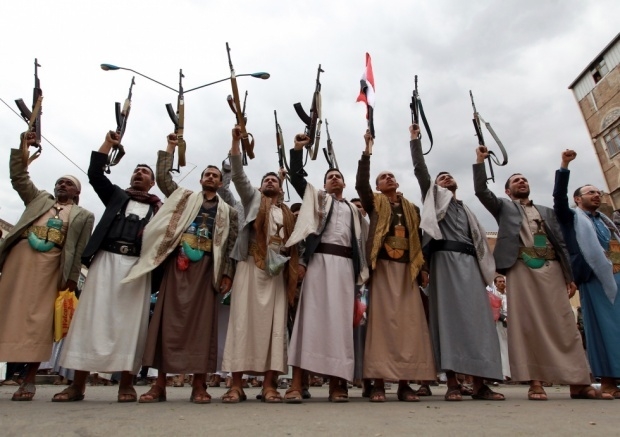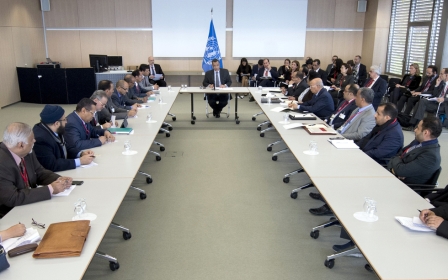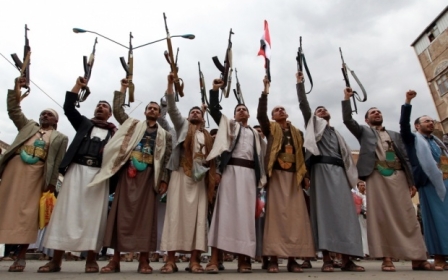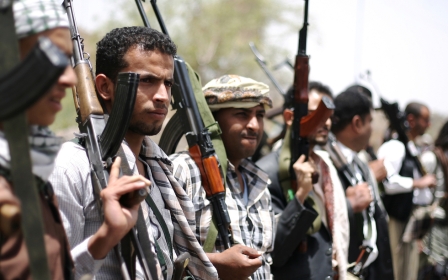Yemen rivals 'begin prisoner swap' as peace talks continue

Yemen's pro-government forces and Houthi rebels have begun an exchange of hundreds of prisoners, an official has told the AFP news agency, as UN-brokered peace talks continued in Switzerland.
"We have started the exchange in small groups," said Mokhtar al-Rabbash, a member of the prisoners' affairs committee which is close to the government, citing security concerns.
The swap, which is expected to include 375 Houthi rebels and 285 pro-government fighters, is taking place in the southern province of Lahj, witnesses said.
"Due to the security situation, we had to divide the prisoners into groups of 20 each," said Rabbash, adding that the detainees were being transferred in buses.
The statement came on the second day of talks in Biel between representatives from the government of Abd Rabbuh Mansour Hadi, their enemies in the Houthi movement and the Houthis' allies the General People's Congress party (GPC) led by former president Ali Abdullah Saleh.
While officials from both sides told Reuters on Wednesday that a large prisoner exchange had been agreed, other sources denied the reports to MEE.
Getting the rival sides to sit around the same table in the Swiss Olympic Hotel, in the quiet town of Biel, is a major leap forward from an earlier failed round of talks, and a significant first success for Ismail Ould Cheikh Ahmed, the UN's special envoy to Yemen.
Ahmed said the truce "should mark the end of military violence in Yemen and the transition to progress based on negotiations, dialogue and consensus".
The current round of talks is accompanied by a ceasefire agreement, which had been a key condition of the Houthis during earlier negotiations in Muscat, Oman.
The Saudi-led coalition's acceptance of the ceasefire, following weeks of pressure from the US and others, was the first tangible compromise on its part and was intended as a signal of its serious desire for a lasting settlement.
However, only a few hours after the ceasefire came into effect, there have been reports – firmly denied by Houthi sources – of multiple breaches in Taiz, Abyan and Althalea.
According to a GPC delegate at the Biel talks, who spoke to MEE on condition of anonymity, “some commanders do not follow our orders because of personal motivations, we cannot be held responsible”.
The Houthis have also accused the Saudi-led coalition of violating the ceasefire.
In Taiz, which has experienced some of the heaviest fighting in recent months, residents said Houthi fighters were continuing to besiege the city.
Yaseen Abdulwali, 33, a resident in the city's central al-Masbah area, told Middle East Eye: "Taiz city did not witness the truce. Both sides are fighting in Taiz."
"Taiz is not safe to live in and I decided to move my family out, but we cannot pass the siege of the Houthis."
More than 5,800 people have been killed in the country - about half of them civilians - and more than 27,000 wounded since March, according to the UN.
Additional reporting by Nasser al-Sakkaf in Sanaa and Nawal al-Maghafi in Biel
New MEE newsletter: Jerusalem Dispatch
Sign up to get the latest insights and analysis on Israel-Palestine, alongside Turkey Unpacked and other MEE newsletters
Middle East Eye delivers independent and unrivalled coverage and analysis of the Middle East, North Africa and beyond. To learn more about republishing this content and the associated fees, please fill out this form. More about MEE can be found here.




